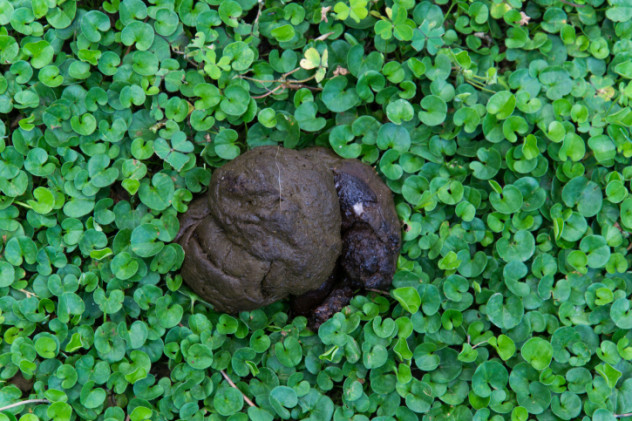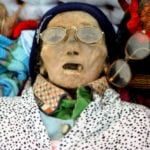10The Tapeworm Diet
A little over 100 years ago, society started giving women the idea that they need to be super thin, but it wasn’t easy for all women to drop the pounds fast. The medical industry saw fit to help these women with diet pills containing tapeworms. It took everyone a while to realize that while tapeworms do cause weight loss, they can also cause diarrhea, vitamin deficiencies, insomnia, and malnutrition. Today, no one is sure if this practice really existed. The only evidence of tapeworm diet pills are old advertisements and rumors. However, these advertisements do indicate that whether or not these diet pills actually contained tapeworms, people wanted them to. Although the sale of tapeworms is now banned in America, there are reports of people buying tapeworms as diet aides online. Inevitably, these people just end up getting sick.
9Bat Blood Cures Blindness
The tropical, marshy environment along the Nile River made eye infections a common problem among the ancient Egyptians. They had to concoct some sort of cure to combat this complaint, and one of the solutions was dripping bat blood into their eyes. The logic behind this cure isn’t actually all that crazy. The Egyptians thought since bats flew around at night, they must have had fantastic eyesight, and their blood might contain magical, eyesight-restoring properties. Of course, we now know that bats have horrible eyesight and only know where they are going thanks to echolocation.
8Having Sex With Virgins Cures STDs
By the 1500s, syphilis had become a big problem all across Europe. People soon realized that the disease spread through sex. Their understanding went badly wrong, however, when it was decided that the way to get rid of syphilis was to have sex with a virgin. People believed at the time that those who had syphilis were diseased by their sexual misconduct and virgins possessed a powerful purity. As a result, by the 1800s, people infected with syphilis were having sex with virgins as a cure. The fault in this method soon became apparent when even more people contracted syphilis. Mercury was also believed to rid people of this pox. They bathed in mercury and rubbed mercury ointments onto their skin, often resulting in death from mercury poisoning. Nevertheless, it was used through the 20th century to cure syphilis, but all it really did was cause tooth loss, nerve damage, and death.
7Cannibalism Cures Everything
As crazy as it sounds, it was shockingly common in Renaissance Europe to use cured human flesh as a cure for countless ailments, including epilepsy, nausea, and the common cold. Many people, including royals and priests, ate human meat and rubbed human fat on their bodies. Some even crafted delectable marmalades made with human blood. Sometimes they didn’t even bother cooking the blood and drank it like a fine wine instead. Treatments that involved human blood and flesh became almost as popular as herbal medicines in the 16th and 17th centuries. European cannibalism was probably inspired by the ancient Greeks and Romans. The Greeks, who followed Galenic medicine, believed illnesses caused an unbalanced body and the only way the body could regain equilibrium was if the sick person ate healthy body parts corresponding to their particular ailment. For example, if you had a headache, you could nibble on some powdered skull to stop the pain. Meanwhile, the Romans started the trend of drinking human blood to cure epilepsy. They believed that untimely deaths left unused energy and life in the body, which could be captured by drinking the blood of fallen gladiators. European folks eased themselves into cannibalism slowly. First, they ate the powdered remains of stolen Egyptian mummies. Later on, they consumed pulverized skull powder before finally upgrading to eating human flesh. They mostly ate the bodies of dead beggars, lepers, and executed prisoners. Just like the Romans, they thought they could gain the years that should have been left of these people’s lives. This idea persisted for an astonishing length of time, but in the 1700s, most people finally stopped calling cannibalism “medicine.”
6Women Had Roving Uteruses
The belief of the wandering womb originated from the ancient Greeks, who thought uteruses traveled around women’s bodies to follow good scents and run away from bad ones. Overwork and sexual abstinence was also thought to contribute to the womb’s movement. The wandering womb was said to cause an array of physical and emotional ailments for women, which were were lumped under the catch-all term of “hysteria.” Symptoms of hysteria might include lethargy, headaches, vertigo, choking, suffocation, and heartburn. Even though men were acknowledged to have similar symptoms, it was never considered that their sexual organs were the cause. There were two solutions for troublesome traveling womb: One could lure the womb back home by inserting pleasant-smelling vaginal suppositories and smelling or swallowing something nasty (sometimes including feces), or simply get pregnant. It took society well over 2,000 years to finally let go of the idea of the wandering womb. Even though the concept had mostly faded from medicine by the Enlightenment, hysteria was still regarded as a genuine phenomenon hundreds of years later. By the 1700s, the disease was blamed on women’s suggestible and damaged brains. This idea persisted until the mid-1900s.
5Penises Should Be Cultivated Like Houseplants
Back in the day, people used something called the “theory of humors” to explain medical conditions and the state of the human body. The theory was that since the world was composed of four elements (earth, air, water, and fire), there were four corresponding states of the human body (cold, dry, moist, and hot). Men were believed to have warm, dry bodies, which allowed them to grow penises. Women, however, were cold and wet like frigid swamps, so they lacked the proper conditions to grow penises. You would think that the ancient Greeks—the same civilization that introduced geometry and democracy—would have known that plants grow best with warmth from the Sun and moisture from water, but they seem to have ignored the importance of moisture with this belief. Furthermore, vaginas are not exactly known for their icy temperatures.
4Spiderwebs Combat Malaria
A few hundred years ago, malaria was a devastating diagnosis with a high mortality rate and no known cure. Before quinine and modern medicines were implemented, people decided that the answer to the yellow fever was consuming the silky strands of protein that come out of spider abdomens. Of course, they weren’t just sitting around gnawing on spiderwebs—that would be barbaric. Instead, they tucked the webs inside tablets to give to people who were suffering from malaria. Surprisingly enough, this did absolutely nothing, so to make the spiderweb cure more potent, sick people were instructed to eat actual spiders in butter in addition to the web pills. Somehow, that also failed. The Italians had a particular cure for malaria that was just as bizarre and ineffective: carrying around a spider enclosed in a walnut shell. Luckily, people no longer have to eat spiders and their webs to cure malaria. After quinine was first introduced to Europe in the 1600s, the ineffective spiderweb cure became obsolete.
3Smoking Tobacco Cures Asthma And Cancer
When Europeans arrived in the Americas and first made contact with the natives, they found tobacco. They observed the natives smoking tobacco during religious celebrations and for medical purposes, so they took a small amount back to Europe. By the mid-1500s, the Europeans figured out how to ship enough tobacco from the New World for mass consumption, and everyone decided they should smoke it. Tobacco became wildly popular in only a few decades. It took even less time for people to decide that it was a sacred healing herb that could cure all of their ailments, despite a lack of any supporting evidence. One doctor, Nicolas Monardes, claimed that tobacco could cure 36 different health problems, including cancer. People even thought smoking cured asthma. These ideas prevailed through the 1920s. Doctors didn’t start noticing that smoking caused health issues until the 1930s. A few decades later, they finally figured out that smoking caused and exacerbated many diseases, including asthma and cancer.
2Elves Cause Illness
Whether you’re more familiar with the elves at Santa’s workshop who build toys or the ones who live in trees and bake delicious cookies, every image you’ve ever had of elves is about to be destroyed. These quaint and innocent renderings of elves wouldn’t have existed if you lived in Europe during the Middle Ages. That’s because people believed that elves were in league with the devil and sought to make humans sick by shooting them with tiny arrows. As horrifying as it is to imagine demonic elves wielding miniature bows of destruction, more than one group of people believed this. Scandinavians believed in dark elves who created endless mischief, mostly spending their days causing devastating diseases. The English also believed elves caused disease, while the Scottish believed that arrows shot by elves caused internal pain and had the ability to afflict livestock in addition to humans. Those afflicted by elf-shots were treated as though they were possessed by a demon: They smoked herbs to expel evil spirits, prayed, and drank holy water to banish diseases caused by elves.
1The Healing Properties Of Dog Poop
It’s safe to say that all of us have had a sore throat at some point in time, and we have all sought some sort of relief. It’s also probably safe to say that none of us have ever thought of swallowing dog poop to relieve a sore throat, but this was a fairly common cure in the Middle Ages. People actually searched for white dog poop, crushed the dried poop into a powder, and mixed it with honey to soothe a scratchy throat. Although the treatment’s effectiveness is unknown, the risk of consuming dog feces far outweighs any potential benefits. It includes the possibility of nausea, vomiting, abdominal pains and cramps, fever, and even bloody diarrhea. It’s pretty amazing that anyone of European ancestry is even alive today. Julie Battin is a student at Lock Haven University of Pennsylvania.
























